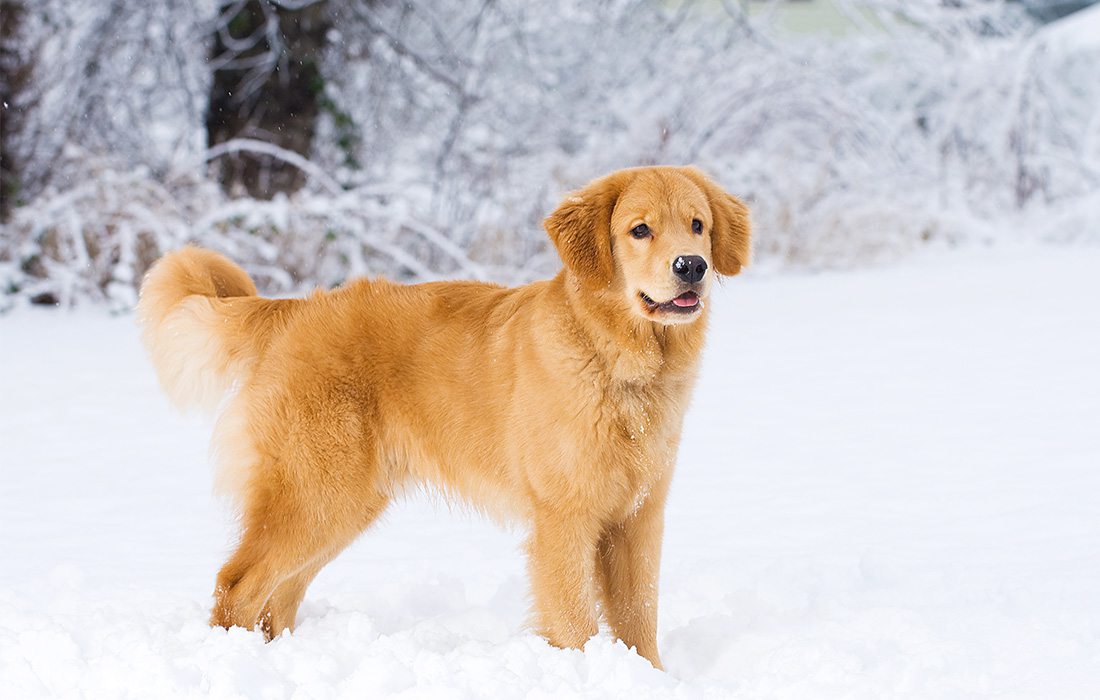Spaces
Don’t Let Your Pets Freeze with These Wintertime Tips
You’re already well equipped for snow, ice and sleet, but is your pet?
By Hanna Flanagan
Jan 2019

If it’s too cold for you, it’s too cold for your pet—you’ve probably heard this before. It’s a great rule of thumb, especially for pets who are extra sensitive to freezing temperatures, like older animals and small, short-haired or muscular breeds. Petsway co-owner Karl Keller says to be very aware of how much time your pet is spending outside during the winter months. And, if your furry friend just insists on outdoor playtime, wrapping them in a coat, fleece or sweater is a simple, but effective, precautionary measure.
Okay so, as a responsible pet owner, you might already be aware of these strategies. But, there are several lesser known safety tips you should read up on this season. One being the dangers of de-icers, which are all over Springfield streets, sidewalks and parking lots this time of year. Because these chemical agents are toxic to animals, you’ll want to thoroughly wash your dog’s paws before they even have a chance to start licking. Or, to avoid the situation altogether, Keller suggests purchasing a nontoxic de-icer. “Make sure to use a de-icer that has a pet and kid-friendly label,” Keller says.
Neoprene booties, no matter how silly they look, are also a surefire way to protect your canine from getting ice, salt or de-icers stuck in between their paws. Keller says booties are especially beneficial for indoor dogs who aren’t used to the cold weather, as they’re more susceptible to damaging their paw pads on frozen surfaces.
Fetch Pet Supplies & Gifts store owner Jennifer Silverberg says some animals are attracted to the sweet smell of antifreeze, another chemical commonly used during the winter. Be sure to clean up every last trace of an antifreeze spill in your garage, as it is a “lethal poison for dogs and cats,” according to the American Society for the Prevention of Cruelty to Animals. To be extra safe, ASPCA suggests using an antifreeze brand that contains propylene glycol, not ethylene glycol.
Silverberg also says that, just like you and me, some dogs struggle with dry and flaky skin in chilly weather. The key to preventing this problem is adjusting your pet’s diet. Adding coconut oil supplements—because what can’t coconut oil cure?—or fish oil, and switching to a fish-based food source will infuse omega-3 fatty acids into your pet’s diet to relieve dryness. “For healthy skin and coat, it’s also important to make sure your dog has a high-quality food,” Silverberg says. Silverberg says to purchase brands that have no added byproducts and a named meat as the first ingredient. Petco merchandising manager Amy Garoutte and Silverberg both recommend a boost in portion size during the winter months as well. “Just like people do, they do burn calories a lot more when it’s colder outside,” Garoutte says. As for outdoor pets, proper shelter and heated water bowls are crucial. An igloo-style kennel equipped with a heated blanket and an anti-freeze water bowl will keep your pup cozy and hydrated during the often brutal Missouri winters.
Where to get your wintertime pet supplies:
Petsway
Multiple 417-land stores
K&H Pet Products Lectro-Soft Outdoor Heated Beds, starting at $59.99
K&H Pet Products Thermal-Bowl, $24.99
Fetch Pet Supplies & Gifts
1332 E. Republic Road, Springfield
417-368-1295
Vital Planet Skin & Coat Tablets, $24.99
Ruffwear Summit Trex Boots, $49.99
SafePaw Salt Ice Melt, $19.99
Fox + Hound Paw Protection Salve, $16.99
Kurgo Loft Jacket, $34.99












